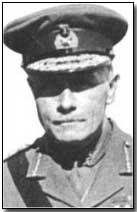Primary Documents - Sir George Milne on the Vardar Offensive, September 1918
 As the Allies increased
pressure upon German forces on the Western Front, so German troops were
hastily transferred from assisting Bulgaria, leaving
Bulgarian forces severely weakened and increasingly demoralised.
As the Allies increased
pressure upon German forces on the Western Front, so German troops were
hastily transferred from assisting Bulgaria, leaving
Bulgarian forces severely weakened and increasingly demoralised.
The moment was consequently considered ripe for a major Allied offensive against Bulgarian forces, newly aided by a Greek force donated by pro-Allied Prime Minister Eleutherios Venizelos. The Allied forces in the region were led by French General Franchet d'Esperey; he determined to launch the Vardar Offensive on 15 September 1918.
Allied success was immediate and impressive; within little over a week Bulgaria solicited for a ceasefire and on 29 September 1918 Bulgaria signed an armistice, thereby exiting from the war. In consequence of Bulgaria's military defeat King Ferdinand shortly afterwards abdicated.
Reproduced below is the official report by British regional commander Sir George Milne.
Click here to read d'Esperey's official report summarising the offensive. Click here to read a statement issued by Colonel Frantzis, Greek Military Attaché in London, on 29 September 1918. Click here to read d'Esperey's official telegram to Venizelos in praise of Greek troops. Click here to read Venizelos' own statement issued to local Greek commanders. Click here and here to read Milne's statements similarly lauding Greek efforts. Click here to read a statement issued by the Bulgarian government requesting a ceasefire. Click here to read the terms of the Bulgarian armistice. Click here to read the text of Tsar Ferdinand's abdication statement.
Sir George Milne's Official Report on the Vardar Offensive
In connection with the offensive by the Serbians and French in the mountain country between the Vardar and Cerna Rivers, which began on September 15th, operations were carried out by the Anglo-Greek force with the object of keeping hostile reserves in the Vardar Valley.
On September 1st the 27th Division had captured a portion of the enemy's line west of the Vardar. On the 18th the British and Greeks attacked, and after severe fighting Doiran town and a considerable extent of the enemy's first and second lines were captured.
The attack was renewed on the 19th, and further progress was made, while the enemy had to use his reserves to restore his front, and no troops were able to leave the line in front of the British to oppose the Serbians.
The principal part of the fighting was borne by the 22nd Division, the 77th Infantry Brigade and the Greek Seres Division. All troops, both British and Greek, fought with great determination. The Greek soldiers showed remarkable valour and tenacity.
Owing to the cutting of his communications by the Serbians, the enemy started a retirement in the Vardar Valley on the night of September 21st.
Source: Source Records of the Great War, Vol. VI, ed. Charles F. Horne, National Alumni 1923
A 'scorched earth policy' was the practice of deliberately destroying crops, food supplies and other facilities to prevent an invading enemy from using them.
- Did you know?
